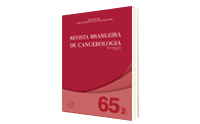Anorexia: an Eating Challenge in Palliative Care
DOI:
https://doi.org/10.32635/2176-9745.RBC.2019v65n2.98Keywords:
Anorexia, Palliative Care, Nutrition Rehabilitation, Neoplasms, Quality of LifeAbstract
Anorexia is a symptom characterized by partial or total reduction of appetite leading to weight loss and nutritional deficiency. It can be triggered by several metabolic and immune disorders. Feeding an advanced cancer patient is a challenge due to various physiological, psychological and social factors that can be an impediment to proper protein and caloric intake. Palliative care consists of a set of practical assistance measures for advanced cancer patients who require special care for addressing serious, chronic, degenerative, progressive, and life-threatening illnesses. Focusing on the conviction that nutritional intervention can significantly improve an advanced cancer patient's quality of life in palliative care, this article addresses the importance of debate on eating challenges in anorexia as well as highlights the dietitian’s role in multidisciplinary team.
Downloads
Downloads
Published
How to Cite
Issue
Section
License
Os direitos morais e intelectuais dos artigos pertencem aos respectivos autores, que concedem à RBC o direito de publicação.

This work is licensed under a Creative Commons Attribution 4.0 International License.









